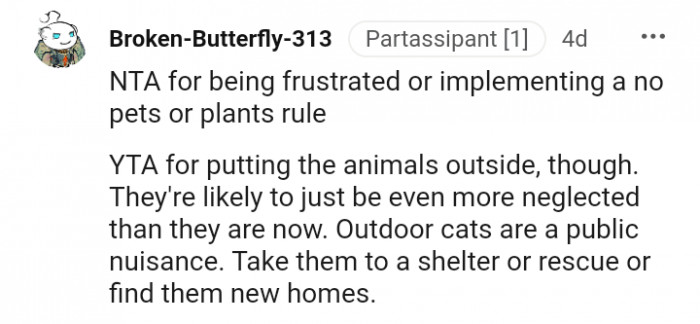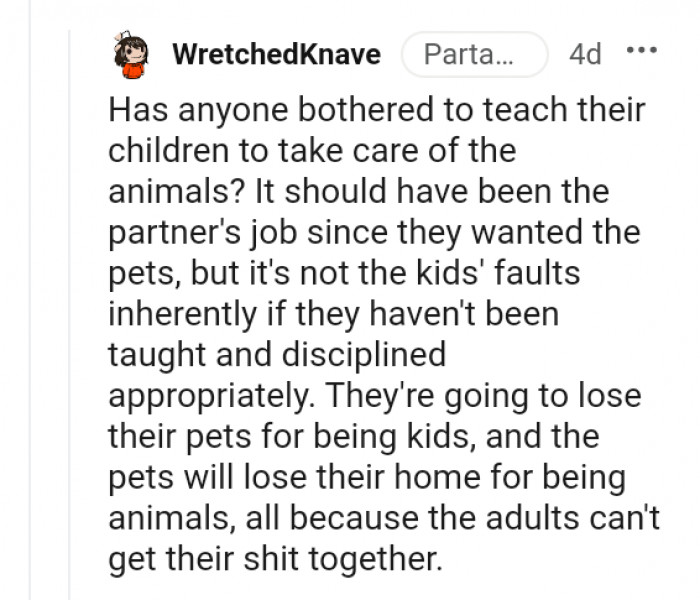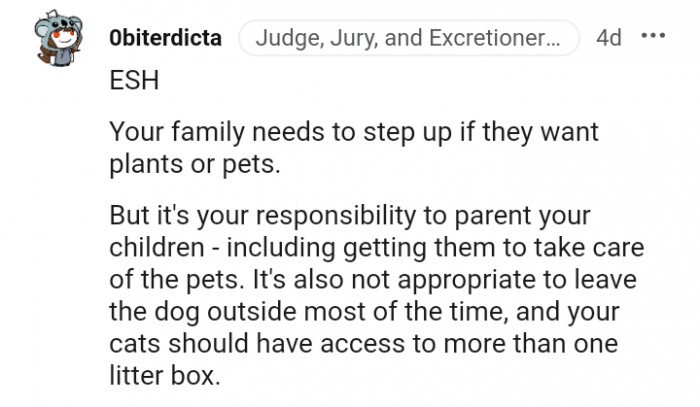Woman Enforces Strict "No Pets And Plants Inside" Policy; Reddit Community Reacts
Pets and plants are lovely additions to any family. There’s no disputing this fact.
Anyone who disagrees doesn’t understand how unique these living things are and how much they can increase a family’s happiness.
Scientifically, they are great for families because they help children learn responsibility and improve impulse control and social skills.
Children aren’t the only ones who enjoy the perks of having a pet or a plant; parents do too! They help parents maintain a schedule as well as stay active.
However, like everything, having pets or plants is not all roses and rainbows. It requires a lot of attention and effort to care for them.
Unfortunately, not everyone in a family can provide the care and attention these living beings require. This may cause inconveniences for other family members who are left to handle things alone.
We found a story that paints a similar picture on the AITA subreddit. A woman shared that her kids wanted pets, so they got a dog and two kittens. In addition, her husband acquired house plants.
Although they enjoyed having pets and plants, they failed to take care of them. This forced the original poster (OP) to be responsible for catering to them alongside her busy schedule.
OP shared that after more than a year, she became fed up and decided to enforce a "no pets or plants inside" policy. The consequence was that the dog and cats would stay outdoors until everyone was ready to take responsibility for them.
However, it seems not everyone is happy with this policy at home. So, she decided to present the matter to the Reddit community for some advice.
Check out the full story below!
No room for plants or animals inside the home with this Redditor around

OP's kids and partner love having pets and plants inside the house, but unfortunately, none of them make an effort to properly care for them

OP decided to enforce a strict policy that prevents animals and plants from being inside the house until everyone can prove they are ready to be responsible for them

The Role of Boundaries
Setting boundaries is critical for maintaining mental well-being. According to research published in the Journal of Family Psychology, establishing clear emotional and physical limits helps individuals regulate their stress levels and promotes healthier relationships.
This is especially relevant in domestic settings, where pets and plants can become sources of tension. A licensed psychologist emphasizes that effective boundary-setting involves open discussions about needs and expectations, which can lead to compromise and greater harmony.
Families can benefit from structured discussions around pet and plant policies. Research in family therapy emphasizes the importance of collaborative decision-making, which can foster a sense of ownership and respect among all members.
Facilitating family meetings where everyone shares their perspectives can lead to more inclusive policies that satisfy different needs. This process can reduce resistance and create a more harmonious home environment by ensuring that everyone's voice is heard.
Setting Boundaries in Family Dynamics
This scenario illustrates the importance of establishing boundaries within family environments, particularly regarding pets and plants.
Research in family psychology emphasizes that clear boundaries can help reduce conflict and promote healthier relationships.
Understanding each family member's needs is essential for creating a harmonious living environment.
The post went viral, garnering 8.2k upvotes and over 2k comments. Here's how the Reddit community reacted to the story:
"NTA for being frustrated or implementing a no pets or plants rule. YTA for putting the animals outside, though"

"If the home isn't fit for the pets, move them to one that is"

"Please OP, please rehome them instead of just putting them outside."

The presence of pets and plants in the home can significantly enhance emotional health. Studies indicate that pet ownership is linked to lower levels of anxiety and depression, creating a comforting environment.
Research published in the Journal of Personality and Social Psychology demonstrates that interacting with animals can increase levels of oxytocin, promoting feelings of connection and reducing stress. When families consider policies like 'no pets and plants inside,' they may overlook the potential for these elements to enhance their overall emotional climate.
The woman's strict policy on pets and plants may reflect deeper values around cleanliness and organization.
Studies indicate that personal values often shape household rules and can lead to misunderstandings among family members.
"I literally gasped like a Victorian maiden when OP said they made the animals outside pets"

"YTA. You are punishing the dog for your partner's laziness"

"Has anyone bothered to teach their children to take care of the animals?"

Communication and Conflict Resolution
Effective communication is essential for resolving conflicts around family policies. Research in the field of conflict resolution shows that active listening and expressing feelings without blame can lead to more constructive conversations.
According to Dr. John Gottman’s studies on marital stability, couples who engage in open dialogue about their needs tend to have stronger relationships. This approach can be beneficial when families discuss the dynamics of pets and plants, fostering understanding and cooperation.
The Importance of Communication in Family Policies
This situation highlights the need for open communication regarding household policies and expectations.
Research in conflict resolution suggests that having discussions about family rules can lead to greater understanding and compliance from all members.
When everyone feels heard, it fosters a sense of belonging and cooperation.
"You’re punishing them, not the people who don’t look after them. In fact, you are being cruel"

"Don't punish the animals (and the local wildlife) in order to teach the humans to do better."

"YTA for punishing the animals for the humans' actions"

Pets can serve as therapeutic companions, particularly for children. A study from the American Journal of Pediatric Psychology found that interactions with pets help children develop empathy and social skills.
Moreover, the presence of plants in the home has been linked to improved concentration and mood stability. Therefore, rather than enforcing strict policies against them, families could benefit from integrating these elements into their lives, promoting mutual responsibility and care.
To navigate disagreements over household policies, families may benefit from establishing a family meeting to discuss concerns and expectations.
According to studies in family therapy, regular check-ins can help maintain harmony and ensure that all members feel included in decision-making.
Creating a culture of respect and understanding can enhance family dynamics.
"Those animals will not understand why they are being punished, and putting cats outside after being indoor animals is quite dangerous for them."

"ESH. You and your animals are used to being indoors and having lives where they get plenty of cuddles; then all of a sudden, they are going to be pushed out of the nice cold/warm house"

"You raised them. If they are lazy, it is your and your husband's fault."

Cognitive Dissonance in Family Dynamics
Cognitive dissonance theory suggests that conflicting beliefs can create psychological discomfort, especially within family settings. When one family member enforces a strict 'no pets and plants' policy, it may contradict others' desires for emotional connection and care.
This dissonance can lead to tension and resentment. A clinical psychologist notes that addressing these conflicts openly can help families realign their values and reduce discomfort, ultimately fostering a more cohesive living environment.
Understanding Emotional Reactions to Rules
This scenario also reflects the emotional responses individuals have toward household rules, particularly when they feel their preferences are being disregarded.
Research indicates that perceived unfairness can lead to resentment and conflict within families.
Recognizing and addressing these emotional responses is crucial for maintaining healthy relationships.
"Either tell your family to step up, or they go to a shelter or you find homes for them."

"Putting them outside is a terrible solution."

"ESH. Your family needs to step up if they want plants or pets"

Incorporating pets and plants into family life can enhance responsibility among children, fostering essential life skills. Research published by the American Psychological Association highlights that caring for living things teaches children about commitment and empathy.
Parents can create structured routines that involve children in the care of pets and plants, helping them learn valuable lessons about nurturing and responsibility. This approach not only reinforces family bonds but also encourages the development of prosocial behaviors.
Ultimately, fostering a culture of respect and understanding requires commitment from all family members.
As highlighted in family psychology literature, creating a safe space for discussing feelings and preferences can significantly enhance family cohesion.
"ESH...Why not just rehome the animals to a place where they will be taken care of? That way, you won't have to put in more effort for something you don't seem to want in the first place"

After reading the comments, OP had some things to say.
OP explained that she wasn't really knowledgeable about how to rehome adult pets, nor did she know how to force her partner and kids to do the right thing

She further explained that the pets aren't being tossed into the jungle; rather, their backyard is covered and provides adequate shelter for the animals.

Emotional Benefits of Nature
Research shows that exposure to nature, including the presence of plants, can significantly enhance mental well-being. A study published in Environmental Science & Technology found that spending time in green spaces reduces stress and boosts mood.
In families, introducing plants can create a calming atmosphere and encourage mindfulness, which may counterbalance the stress of household conflicts. Practicing mindfulness in caring for plants can also provide a shared family activity that promotes emotional resilience.
Having a pet or plant is not for the faint-hearted. Now imagine having both! It’s a lot of work, but it’s gratifying.
Unfortunately, OP’s family doesn’t seem ready for the work that comes with the rewards.
Most people in the comments section believe OP’s family doesn’t deserve the privilege of having pets and plants. As such, they should be taken away and given to those who can properly care for them.
Do you think OP was wrong for enforcing such a policy, or are you on her side in this matter? Let us know in the comments below!
Psychological Analysis
This scenario exemplifies the challenges of setting boundaries within family dynamics, particularly regarding household rules.
From a psychological perspective, addressing these issues requires open dialogue and a commitment to understanding each family member's perspective to foster cooperation and harmony.
Analysis generated by AI
Analysis & Alternative Approaches
This situation underscores the complexities of establishing household policies and the psychological factors that influence family dynamics.
Research supports the notion that clear communication and mutual respect are essential for maintaining harmony in family environments.
Psychological Framework & Solutions
Research highlights the significant emotional and psychological benefits of integrating pets and plants into family life. By fostering responsibility, empathy, and connection, these living elements can enhance overall well-being.
Moreover, employing effective communication strategies and collaborative decision-making can help families navigate conflicts regarding household policies. As studies suggest, creating an environment where all members feel valued leads to reduced stress and improved family cohesion. Ultimately, a mindful approach to discussing these elements can foster a more nurturing and supportive atmosphere.



